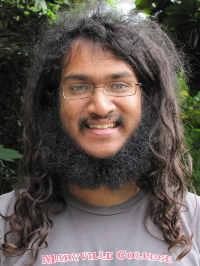2014 SRE Program Participant Profile: Winode Handagama

|
Hometown: Knoxville |
Why did you apply to the SRE program?
I've always been interested in modeling biological systems, so when I heard about this program, I figured it would be a perfect opportunity to gain experience in such a field.
How did you hear about the program?
My mathematics professor, Maria Siopsis highly recommended that I apply for the program.
What is the purpose of your research?
To understand the body's immune response to the Johne's disease bacteria.
![]()
Meeting all of the participants was one of the more fun parts: forming relationships with people from all around the world who have similar interests and ideas, but remarkably different views of the world is indescribable…
![]()
– Winode Handagama, SRE participant
What does the research ultimately accomplish? What contributions to science and/or humanity does the research ultimately make?
Chronic diseases such as tuberculosis and HIV are difficult to treat primarily because they are slow-growing. In many cases, these pathogens remain dormant inside a host for years, showing no symptoms of the illness whatsoever. If we can understand more about how these microbes live inside of the bodies of their victims, then there is a better likelihood we can develop more effective vaccines and treatments.
Describe a typical day on the job.
Meet at the library or in the building with group members; review the objectives; allocate jobs; have fun working as a group. We eat lunch together while working, and whenever the group needs a break, we have brief periods of "internet goof-ball time". We always try and make sure that we make at least a minute amount of progress each day: some days we get hefty amounts of work done, while other days we spend completing small albeit necessary tasks.
Tell us something about your field of study we would be surprised to know.
One-third of the human population is infected with tuberculosis, but up to 95% of infected people show no symptoms.
Do you have an interesting "personal side" to your research experiences that will increase human interest in your story?
Ever since I was a little boy, my mother always encouraged my interest mathematics and science. She would always play little math games on car rides, and take me with her to her lab at UTK. The summer after my freshman year of college, my mother passed away after a 3-year battle with leukemia. This, more than anything, shocked me into confronting the reality that even though humanity has accomplished remarkable feats in the short span that the species has existed, we know remarkably little when it comes to our knowledge of defects in our own biological system. While I don't have a particular affinity for cancer research, this experience undoubtedly influenced my interest in pursuing a career in research.
What were your favorite parts of the SRE program?
My favorite part of the experience was the experience itself. Everything from the moment we met our groups for the first time, to the pizza dinner, and simply being mentored by professionals that make a living doing the research that I've always wanted to be a part of.
Meeting all of the participants was one of the more fun parts: forming relationships with people from all around the world who have similar interests and ideas, but remarkably different views of the world is indescribable in and of itself; however, this taking place within the context of mathematics and biology is a truly enriching experience. I also rather enjoyed the luncheon with Dr. Gross, as he challenged us to look at the "big questions" that our research evoked.
What new experiences did you gain that have helped you today?
The most tangible experience I believe that I have gained is the learning of certain technical skills: programming in R, analyzing a biological question mechanistically, and being able to move through a paper extremely quickly and dissect most relevant facts from complicated literature are a few of countless examples I could name.
What advice would you give someone who's interested in/curious about participating in the program?
Be prepared to work hard, learn much, and have so much fun. Be respectful and prompt when working with your advisors and other faculty, but NEVER feel reservations about asking for help. 99.999% of the time, you will be so thankful you took the time to do so.
Would you recommend our program to others?
Anyone who is thoroughly interested in the future of the life sciences should be in this internship, or a similar research experience. Even if someone is not interested in quantitative approaches to biology should have an experience like this, so they are aware that there are multiple ways to tackle a scientific problem.
What do you do outside of work (hobbies, sports, associations, activities)?
I really enjoy cooking, going to electronic music concerts, and watching Netflix/Hulu. I love going on spur-of-the-moment adventures to cool spots in nature with friends. And as crazy as it sounds, grocery shopping at specialty food stores is my guilty pleasure.
Where do you see yourself in 10 years?
If everything goes according to plan, I would like to be working in a research lab of some sort, either molecular biology and/or immunology. Preferentially, I would like to be taking a quantitative approach to my research, but inevitably, I would like to be working on long-term research of some sort.
Is there anything else you'd like to add?
Never delude yourself into thinking that someone has nothing to teach you.
Have fun.
NIMBioS
1122 Volunteer Blvd., Suite 106
University of Tennessee
Knoxville,
TN 37996-3410
PH: (865) 974-9334
FAX: (865) 974-9461
Contact NIMBioS


